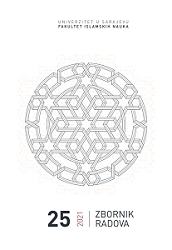Rodna senzitivnost u arapskom jeziku
Gender sensitivity in Arabic
Author(s): Zehra AlispahićSubject(s): Language studies, Gender Studies, Lexis, History of Islam, Qur’anic studies
Published by: Fakultet islamskih nauka u Sarajevu
Keywords: natural gender; grammatical gender; masculine gender; feminine gender; gender agreement; sentence construction;
Summary/Abstract: Traditional Arabic grammarians clearly point out that masculine gender is the basis, that it is primary, and that feminine gender is derived from it. This is the reason why masculine gender comes first and is used more frequently in communication. Nevertheless, it is possible to say that the Arabic language today belongs to the group of languages with a particularly pronounced sensibility in the context of the distinction between masculine and feminine gender. Determining the grammatical gender of nouns in Arabic is done on the basis of semantic (natural gender), formal (morphological) and usage (pragmatic) criteria. The phenomenon of gender in Arabic is deeply rooted in the history of language and God’s Will to “create everything in pairs - male and female”, so is the use of masculine and feminine as grammatical gender regulated by clear grammatical rules. In addition to the theoretical review of numerous divisions between masculine and feminine gender, this paper not only points out some particularities in the construction of nouns and verbs along with the implementation of grammatical principles of gender agreement (concord) between the main sentence parts, but also draws attention to the Qur’anic context and examples of exceptions to the these principles.
Journal: Zbornik radova Fakulteta islamskih nauka u Sarajevu
- Issue Year: 2021
- Issue No: 25
- Page Range: 183-202
- Page Count: 20
- Language: Bosnian

